6 books about Kumar, Amitava
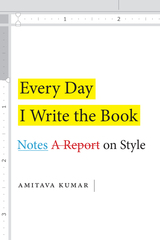
Every Day I Write the Book
Notes on Style
Amitava Kumar
Duke University Press, 2020
Amitava Kumar's Every Day I Write the Book is for academic writers what Annie Dillard's The Writing Life and Stephen King's On Writing are for creative writers. Alongside Kumar's interviews with an array of scholars whose distinct writing offers inspiring examples for students and academics alike, the book's pages are full of practical advice about everything from how to write criticism to making use of a kitchen timer. Communication, engagement, honesty: these are the aims and sources of good writing. Storytelling, attention to organization, solid work habits: these are its tools. Kumar's own voice is present in his essays about the writing process and in his perceptive and witty observations on the academic world. A writing manual as well as a manifesto, Every Day I Write the Book will interest and guide aspiring writers everywhere.
[more]
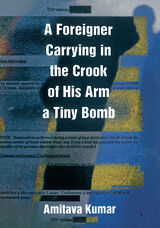
A Foreigner Carrying in the Crook of His Arm a Tiny Bomb
Amitava Kumar
Duke University Press, 2010
Part reportage and part protest, A Foreigner Carrying in the Crook of His Arm a Tiny Bomb is an inquiry into the cultural logic and global repercussions of the war on terror. At its center are two men convicted in U.S. courts on terrorism-related charges: Hemant Lakhani, a seventy-year-old tried for attempting to sell a fake missile to an FBI informant, and Shahawar Matin Siraj, baited by the New York Police Department into a conspiracy to bomb a subway. Lakhani and Siraj were caught through questionable sting operations involving paid informants; both men received lengthy jail sentences. Their convictions were celebrated as major victories in the war on terror. In Amitava Kumar’s riveting account of their cases, Lakhani and Siraj emerge as epic bunglers, and the U.S. government as the creator of terror suspects to prosecute. Kumar analyzed the trial transcripts and media coverage, and he interviewed Lakhani, Siraj, their families, and their lawyers. Juxtaposing such stories of entrapment in the United States with narratives from India, another site of multiple terror attacks and state crackdowns, Kumar explores the harrowing experiences of ordinary people entangled in the war on terror. He also considers the fierce critiques of post-9/11 surveillance and security regimes by soldiers and torture victims, as well as artists and writers, including Coco Fusco, Paul Shambroom, and Arundhati Roy.
[more]
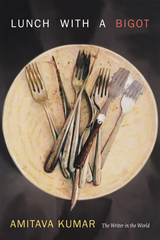
Lunch With a Bigot
The Writer in the World
Amitava Kumar
Duke University Press, 2015
To be a writer, Amitava Kumar says, is to be an observer. The twenty-six essays in Lunch with a Bigot are Kumar's observations of the world put into words. A mix of memoir, reportage, and criticism, the essays include encounters with writers Salman Rushdie and Arundhati Roy, discussions on the craft of writing, and a portrait of the struggles of a Bollywood actor. The title essay is Kumar's account of his visit to a member of an ultra-right Hindu organization who put him on a hit-list. In these and other essays, Kumar tells a broader story of immigration, change, and a shift to a more globalized existence, all the while demonstrating how he practices being a writer in the world.
[more]
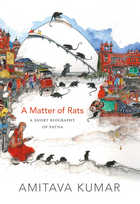
A Matter of Rats
A Short Biography of Patna
Amitava Kumar
Duke University Press, 2014
It is not only the past that lies in ruins in Patna, it is also the present. But that is not the only truth about the city that Amitava Kumar explores in this vivid, entertaining account of his hometown. We accompany him through many Patnas, the myriad cities locked within the city—the shabby reality of the present-day capital of Bihar; Pataliputra, the storied city of emperors; the dreamlike embodiment of the city in the minds and hearts of those who have escaped contemporary Patna's confines. Full of fascinating observations and impressions, A Matter of Rats reveals a challenging and enduring city that exerts a lasting pull on all those who drift into its orbit.
Kumar's ruminations on one of the world's oldest cities, the capital of India's poorest province, are also a meditation on how to write about place. His memory is partial. All he has going for him is his attentiveness. He carefully observes everything that surrounds him in Patna: rats and poets, artists and politicians, a girl's picture in a historian's study, and a sheet of paper on his mother's desk. The result is this unique book, as cutting as it is honest.
Kumar's ruminations on one of the world's oldest cities, the capital of India's poorest province, are also a meditation on how to write about place. His memory is partial. All he has going for him is his attentiveness. He carefully observes everything that surrounds him in Patna: rats and poets, artists and politicians, a girl's picture in a historian's study, and a sheet of paper on his mother's desk. The result is this unique book, as cutting as it is honest.
[more]
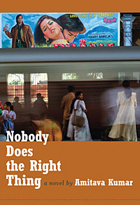
Nobody Does the Right Thing
A Novel
Amitava Kumar
Duke University Press, 2010
A young poet is killed by her lover, a politician, in the eastern Indian state of Bihar. Soon afterward, across India in Bombay, an idealistic journalist is hired by a movie director to write a Bollywood screenplay about the murdered poet. Research for the script takes the writer, Binod, back to Bihar, where he and his cousin Rabinder were raised. While the high-minded Binod struggles to turn the poet’s murder into a steamy tale about small towns, desire, and intrigue, Rabinder sits in a Bihari jail cell, having been arrested for distributing pornography through a cybercafé. Rabinder dreams of a career in Bollywood filmmaking, and, unlike his cousin, he is not burdened by ethical scruples. Nobody Does the Right Thing is the story of these two cousins and the ways that their lives unexpectedly intertwine. Set in the rural villages of Bihar and the metropolises of Bombay and Delhi, the novel is packed with telling details and anecdotes about life in contemporary India. At the same time, it is a fictional investigation into how narratives circulate and vie for supremacy through gossip, cinema, popular fiction, sensational journalism, and the global media.
[more]

World Bank Literature
Amitava Kumar
University of Minnesota Press, 2002
READERS
Browse our collection.
PUBLISHERS
See BiblioVault's publisher services.
STUDENT SERVICES
Files for college accessibility offices.
UChicago Accessibility Resources
home | accessibility | search | about | contact us
BiblioVault ® 2001 - 2024
The University of Chicago Press









